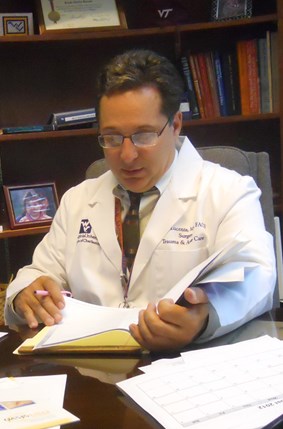Trauma Surgery
The trauma surgeons are prepared to deal with the direst emergencies on a moment’s notice. Three times a year they are forced to perform an open cardiac massage in the Trauma Bay. Three times a year they have to create a pericardial window. Once a year they have to externally stabilize rib fractures. Twenty seven times a year they fix an extremely complex wound.
Today, Dr. Umstot is rounding in the ICU taking care of critically ill patients. Dr. Lucente is draining an intraabdominal abscess and Dr. Hall is repairing a traumatic diaphragmatic laceration in a patient who survived a car wreck. And many of these uncommon circumstances are common for the group of surgeons from this section. And if they are lucky, they will be doing a bronchoscopy, or supervising a chest tube insertion, or the performance of a tracheostomy, or a percutaneous gastrostomy: that would be as close as possible to a routine day.
But they don’t have many routine days.
The trauma section coordinates the care of patients with a multidisciplinary team that involves neurosurgeons, plastic surgeons, orthopedists, urologists, neurologists, and many others that care for these patients daily. The surgeons sleep in the hospital. They round. They worry about their patients. They discuss difficult problems of critical care while they check their ICU patients. They attend weekly trauma conferences, where they come up with ways to improve patient care.
The section of Trauma and Critical Care made it possible to obtain accreditation by the American College of Surgeons as a Trauma Center of Excellence Level I. The standards required to receive approval must be constantly maintained for periodic re-accreditation.
The Trauma Center receives an average of 2900 patients a year, and the trauma surgeons are ready to care for them 24/7.
So, if you have the misfortune of being injured in an accident, you want to be taken care of by any of the surgeons in this group.
They are here, so the community is safer.
And they respond when they are called.

Trauma Center of Excellence Past Chair of the
State Committee on Trauma
Dr. Lucente initiated the Rural Trauma Team program in West Virginia, a structured system to educate rural physicians in the care of trauma victims. He lectures extensively around the state and dictates ATLS, Rural Trauma and Advanced Trauma Operative Management courses.